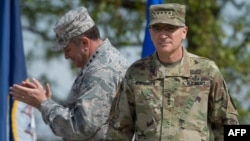As he stepped down as America's top commander in Europe on Tuesday, retiring Air Force General Philip Breedlove recalled how he began his career more than three decades ago trying to keep the peace during the Cold War with the Soviet Union.
"I think my career is now ending here, trying to prevent a Cold War - and continue to keep the peace," Breedlove said in a farewell address, shortly before he received a final salute from troops at European Command headquarters in Germany. "But I hand that mission over now to you."
Breedlove turned over European Command to Army General Curtis Scaparrotti, ending an era during which the straight-talking general helped transform U.S. and NATO planning in Europe after Russia's annexation of Crimea in 2014.
A similar ceremony will take place on Wednesday to pass along Breedlove's other title, NATO supreme allied commander Europe.
Backed by a big increase in U.S. military spending, NATO is setting up small eastern outposts, forces on rotation, regular war games and warehoused equipment ready for a rapid response force, all to deter Russia.
U.S. Defense Secretary Ash Carter acknowledged on Tuesday NATO discussions to strengthen the alliance's position on its eastern flank, possibly by sending four battalions to rotate through the Baltic states and Poland.
The moves effectively represent NATO's biggest build-up in eastern Europe since the Cold War.
The Kremlin denies any intentions to attack the Baltic countries, but it has often said that they have become an aggressive "Russophobic kernel" pushing NATO toward a consistently anti-Russian posture.
Tensions between Washington and Moscow have been highlighted by recent encounters between their militaries. Last month, two Russian warplanes flew what U.S. officials described as simulated attack passes near a U.S. guided missile destroyer in the Baltic Sea.
Despite those incidents, the United States and Russia still work together diplomatically. Carter noted critical U.S. and Russian collaboration, including to secure a deal last year with Iran over its nuclear program.
"That's why we'll keep the door open for Russia. But it's up to the Kremlin to decide," Carter said.
"We do not seek a cold, let alone a hot war with Russia. But make no mistake, we will defend our allies, the rules-based international order, and the positive future it affords us."





